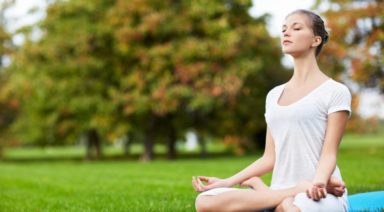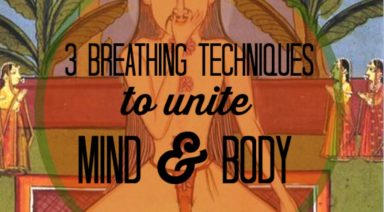7 Ways to Ease Into Meditation

Meditation is for everyone: monks in Tibet, yogis, corporate lawyers, gardeners, the rich, poor, young, and old. We may all approach life differently but in meditation, we are all doing the same thing: quieting the mind and looking within. In a society where information is so readily available, we often look to other sources for opinions and advice. It’s more important than ever to make meditation a priority. Our bodies and minds are our greatest compasses in life. They will always tell us if something we are doing is good for us or not; we just have to stop for a moment to look, feel, and listen from within.
Enter the Here & Now Through Meditation
Whether you’re looking to cultivate more authenticity, increase happiness, improve relationships, or reduce stress, all of these things are accessible to you through the practice of meditation.
Sign up for Here & Now: A Beginner’s Guide to Meditation and fundamentally change your life.
Here are 7 Ways to Ease Into a Meditation Practice:
1. Give yourself some “soft time” before meditation
Often, the moment you try to quiet the mind it will wander in a thousand different directions. “I forgot to do this today… the kids have a big test tomorrow…my husband forgot to take out the trash…there is a sale at the grocery store…I don’t have time to sit here doing nothing…” Give yourself a few minutes to let the mind do this and then ask it to quiet down. Truly ask it; it’s usually responsive.
2. Compose a to-do list
If after letting your mind wander and asking it to quiet down, you are still unable to reach a place of stillness, write those pesky things down, and acknowledge them. Sometimes that’s all thoughts need— acknowledgment.
3. Start a ritual
Meditation can be done anywhere at any time. It can be done in the middle of the subway during rush hour or in the middle of a meeting with your boss (I don’t recommend the latter). I’ve found, though, that training the mind to quiet down in a specific setting prepares it to settle down with less effort. Light candles have chamomile tea, take a bubble bath. Signal to your mind that it’s time to relax.
4. Learn to observe
We are not our thoughts. We have our thoughts. Try to detach yourself and simply watch them go by. View them in a cloud or a bubble and allow them to float away.
5. Focus on the breath
I know, you have heard this a million times. But it works! The best lesson I received in meditation is to focus on the pause between inhales and exhales. The four stages of breath give the mind something to focus on and connect us to our life force. You can focus on the breath and reduce your stress in just 15 minutes with Seize the Day! prior to even leaving the house. It’s lovely.
6. Do yoga
Yoga flows can become a moving meditation. Yin yoga can bring your mind and body into stillness. Kundalini can prepare the breath. Any type of yoga can open the mind and body to meditation. You can’t lose.
7. Think Positive Thoughts
Finally, if you’re having a crazy day and can’t get your mind to settle down, it’s OK. Think positive thoughts. There are days when meditation is easy, days when it takes a little longer to become still, and days when it just doesn’t want to happen. I used to become annoyed with myself if I couldn’t stop the endlessness of my thoughts, but that defeats the purpose. On those days, I ask my mind to come up with as many positive words as it can. Joy, peace, serenity, gratitude, etc. After even just a few minutes of doing this, I guarantee you will be in a calm, peaceful place.
Which Type of Meditation Style is Best For You?

While some may think that meditation requires nothing more than sitting silently, it isn’t necessarily as easy as it seems. The commitment needed to practice every day coupled with the challenge to empty your mind of everyday stressors can be discouraging. However, it doesn’t necessarily need to be.
Meditation has been scientifically proven to reduce stress and anxiety, improve health, and increase happiness. However, the most essential aspect of meditation is appealing to your spirit. It is an entirely subjective practice and there is no right or wrong way to meditate. By practicing every day and finding a style that compliments your soul – you’ll not only experience the joy in meditation, but you might just find you’re better at it then you thought!
The following is a list of the most common types of meditation. Discover which one speaks to you!
Types of Meditation
The following are the most common types of meditation styles. Before you begin, ask yourself a few questions:
- Do you find increased focus through movement?
- Does darkness help you to relax?
- Do you find sounds calming or distracting?
- Are you trying to focus your mind or empty it?
Answering these simple questions can help you to narrow down which type of meditation is most suited for you. If by the end of this article you still can’t decide – Why not try them all?































